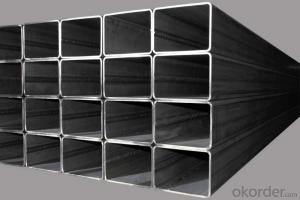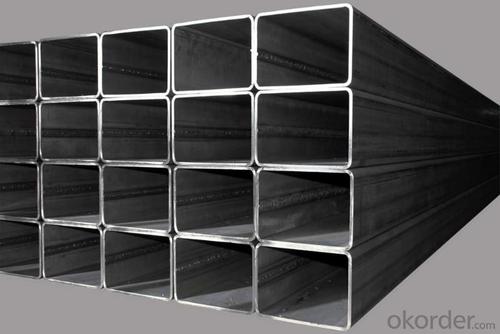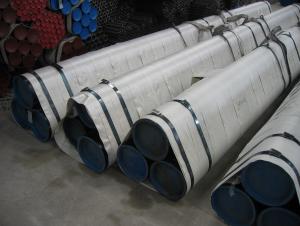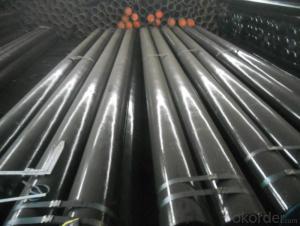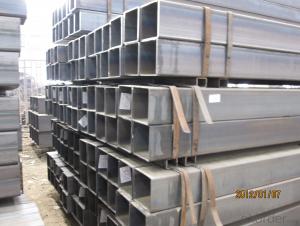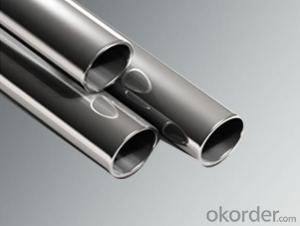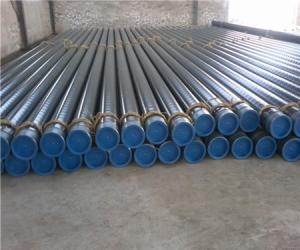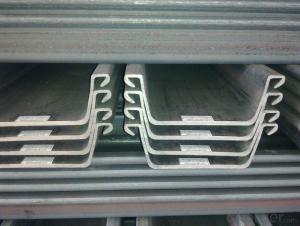Carbon Steel Hollow Section
- Loading Port:
- China Main Port
- Payment Terms:
- TT or LC
- Min Order Qty:
- 25 m.t.
- Supply Capability:
- 8000 m.t./month
OKorder Service Pledge
OKorder Financial Service
You Might Also Like
1、Structure of Carbon Steel Hollow Section:
.It is made by welding the steel plate.
2、Main Features of Carbon Steel Hollow Section:
• High manufacturing accuracy
• High strength
• Small inertia resistance
• Strong heat dissipation ability
• Good visual effect
• Reasonable price
3、Carbon Steel Hollow Section Specification:
Standard | GB, DIN, ASTM ASTM A106-2006, ASTM A53-2007 |
Grade | 10#-45#, 16Mn 10#, 20#, 45#, 16Mn |
Thickness | 8 - 33 mm |
Section Shape | Square/ Rectangular |
Outer Diameter | 10*10 and above |
Place of Origin | Tianjin |
Secondary Or Not | Non-secondary |
Application | Hydraulic Pipe |
Technique | Cold Drawn |
Certification | API |
Surface Treatment | factory state or painted black |
Special Pipe | API Pipe |
Alloy Or Not | Non-alloy |
Length | 5-12M |
Outer Diameter | 10*10 and above |
Grade | 20#, 45#, Q345, API J55, API K55, API L80, API N80, API P110, A53B |
Standard | ASME, ASTM |
1) Material:20#(ASTM A 106/A53 GRB.API5LGRB,GB),45#,16Mn,10#.
2) Specification range:OD:21.3-610mm,WT:6-70mm,length:6-12m or according to the requirement of clients.
3) Excutive standards:GB,ASME API5L.ASTM A 106/A53,Despite of the above standards,we can also supply seamless steel pipe with standard of DIN,JIS,and so on,and also develop new products according to the requirements of our clients!
4) Surface:black lacquered,varnish coating or galvanized.
5) Ends:Beveled or square cut,plastic capped,painted.
6) Packing:bundles wrapped with strong steel strip,seaworthy packing.
4、Packaging & Delivery
Packaging Details: | seaworthy package,bundles wrapped with strong steel strip |
Delivery Detail: | 15-30days after received 30%TT |
5、FAQ of Carbon Steel Hollow Section:
①How is the quality of your products?
Our products are manufactured strictly according to national and internaional standard, and we take a test
on every pipe before delivered out. If you want see our quality certifications and all kinds of testing report, please just ask us for it.
Guaranteed: If products’ quality don’t accord to discription as we give or the promise before you place order, we promise 100% refund.
②How about price?
Yes, we are factory and be able to give you lowest price below market one, and we have a policy that “ for saving time and absolutely honest business attitude, we quote as lowest as possible for any customer, and discount can be given according to quantity”,if you like bargain and factory price is not low enough as you think, just don’t waste your time.Please trust the quotation we would give you, it is professional one.
③Why should you chose us?
Chose happens because of quality, then price, We can give you both.Additionally, we can also offer professional products inquiry, products knowledge train(for agents), smooth goods delivery, exellent customer solution proposals.Our service formula: good quality+good price+good service=customer’s trust
SGS test is available, customer inspection before shipping is welcome, third party inspection is no problem.
6、Carbon Steel Hollow Section Images:
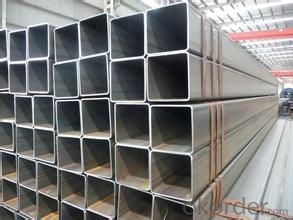
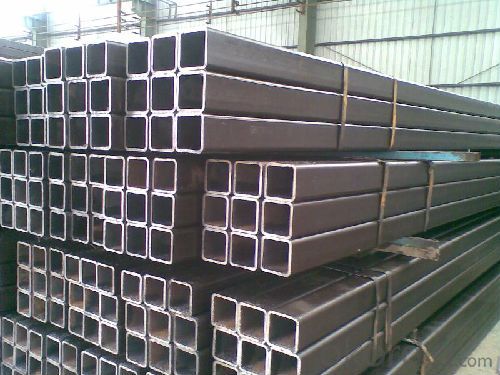
- Q: How are steel pipes transported and stored?
- Steel pipes are typically transported by loading them onto trucks or shipping containers, while larger pipes may be transported by rail or barge. During transportation, pipes are secured and protected from damage using straps, braces, or foam padding. Once at the storage site, pipes are usually stacked in a designated area, either vertically or horizontally, depending on their size and weight. They may also be stored in racks or on stands to prevent them from rolling or collapsing. Proper storage conditions include keeping the pipes away from moisture, extreme temperatures, and corrosive substances to maintain their quality.
- Q: What are the different methods of pipe coating for steel pipes?
- There are several different methods of pipe coating for steel pipes, each with its own advantages and applications. One common method is fusion bonded epoxy (FBE) coating. This involves heating the steel pipe and applying a thermosetting powder that melts and adheres to the surface, creating a strong and durable coating. FBE coating provides excellent corrosion protection and is commonly used in the oil and gas industry. Another method is liquid epoxy coating. This involves applying a liquid epoxy resin to the surface of the steel pipe, which then cures and forms a protective barrier. Liquid epoxy coating is often used for smaller diameter pipes and provides good chemical resistance. Polyethylene (PE) coating is another popular method, particularly for pipelines that will be buried underground. PE coating involves wrapping the steel pipe with a layer of polyethylene, which provides excellent resistance to water, chemicals, and abrasion. Polyurethane (PU) coating is another option, offering a high level of chemical resistance and flexibility. It is typically used for offshore applications and in environments with extreme temperatures. Other methods of pipe coating include coal tar enamel (CTE) coating, which provides excellent resistance to water and chemicals, and concrete weight coating, which adds weight to the pipe to ensure stability in underwater or subsea applications. In summary, the different methods of pipe coating for steel pipes include fusion bonded epoxy (FBE), liquid epoxy, polyethylene (PE), polyurethane (PU), coal tar enamel (CTE), and concrete weight coating. The choice of coating method depends on the specific requirements of the application, such as corrosion protection, chemical resistance, or stability.
- Q: What are the advantages of using steel pipes in the manufacturing of storage tanks?
- There are several advantages of using steel pipes in the manufacturing of storage tanks. Firstly, steel pipes are highly durable and have a longer lifespan compared to other materials, ensuring the longevity of the storage tank. Secondly, steel pipes have high strength and can withstand high pressure and extreme temperatures, making them suitable for storing a wide range of substances. Additionally, steel pipes are resistant to corrosion and can be coated to further enhance their protection against rust and other chemical reactions. Lastly, steel pipes are readily available and can be easily fabricated, making them a cost-effective choice for the manufacturing of storage tanks.
- Q: Difference between seamless steel pipe and welded pipe
- Welding pipes can be used in water pipelines, gas pipelines, heating pipes, electrical appliances, pipelines and so on.
- Q: 25 of the steel pipe with 6 in charge of what is the difference?
- Outer diameter representation of steel pipe:When the design is nominal diameter DN means diameter, should be nominal diameter DN and the corresponding product specifications table. Specification for unplasticized polyvinyl chloride pipes for building drainage, de (nominal outer diameter) * e (nominal wall thickness), (GB, 5836.1-92), polypropylene (PP) pipe for water supply, specifications by de * e (nominal outer diameter * wall thickness).
- Q: How are steel pipes used in the aerospace manufacturing industry?
- Steel pipes are used in the aerospace manufacturing industry for a variety of applications, including fuel and hydraulic systems, structural components, and engine parts. They provide durability, strength, and corrosion resistance, ensuring the safety and reliability of aircraft.
- Q: How are steel pipes used in the construction of hydroelectric power plants?
- Steel pipes are used in the construction of hydroelectric power plants for various purposes, such as transporting water, containing and directing the flow of water, and supporting the weight of turbines and other equipment. They are typically used for penstocks, which are large pipes that carry water from the dam to the turbines, and for discharge pipes that release water back into the river. The strength and durability of steel pipes make them ideal for withstanding the high pressure and heavy loads involved in hydroelectric power generation.
- Q: Can steel pipes be used for heat exchangers?
- Yes, steel pipes can be used for heat exchangers. Steel pipes are often preferred for heat exchangers due to their high thermal conductivity, durability, and resistance to corrosion. They are commonly used in various industries including power generation, chemical processing, and HVAC systems.
- Q: Do steel pipes require maintenance?
- Yes, steel pipes do require maintenance. While steel pipes are durable and long-lasting, they can still be subject to wear and tear over time. Regular maintenance is important to ensure their optimal performance and prolong their lifespan. One important aspect of maintenance is inspecting the pipes for any signs of damage or corrosion. Steel pipes can be vulnerable to rust and corrosion, especially in environments with high humidity or exposure to water. Regular inspections allow for early detection of any issues, which can prevent more significant damage and costly repairs in the future. Another aspect of maintenance is cleaning the pipes. Over time, steel pipes can accumulate debris, sediment, or mineral deposits. These build-ups can restrict the flow of fluids or affect the quality of the transported materials. Regular cleaning helps to remove these obstructions and maintain the efficiency of the pipes. Depending on the application, steel pipes may also require periodic lubrication or coating. This helps to reduce friction, prevent corrosion, and enhance the pipes' durability. Lubricants and coatings can be applied during maintenance to ensure the pipes continue to function smoothly and resist corrosion. Overall, regular maintenance of steel pipes is essential to maximize their performance, prevent damage, and prolong their lifespan. By investing time and effort in maintenance, potential issues can be identified and addressed early on, ultimately saving time and money in the long run.
- Q: Are steel pipes suitable for underground nuclear waste storage?
- Yes, steel pipes are suitable for underground nuclear waste storage. Steel pipes are known for their durability, strength, and resistance to corrosion, making them an ideal choice for safely containing and transporting nuclear waste underground. Additionally, steel pipes can withstand the high pressures and temperatures associated with nuclear waste, ensuring the integrity of the storage system.
Send your message to us
Carbon Steel Hollow Section
- Loading Port:
- China Main Port
- Payment Terms:
- TT or LC
- Min Order Qty:
- 25 m.t.
- Supply Capability:
- 8000 m.t./month
OKorder Service Pledge
OKorder Financial Service
Similar products
Hot products
Hot Searches
Related keywords
